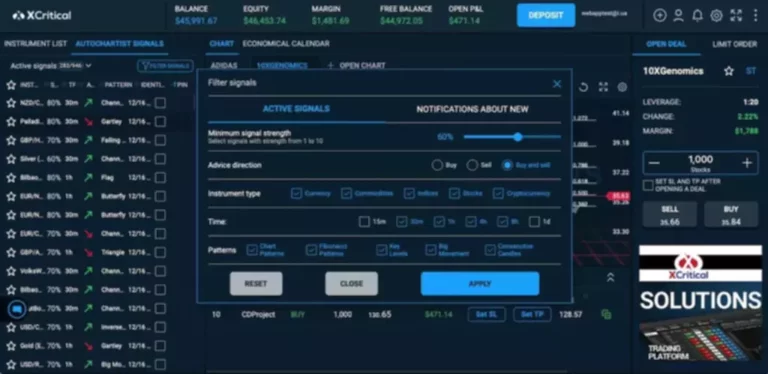Content
Most wallets are limited to basic transactions, such as sending and receiving cryptocurrencies. Though some like Guarda Wallet offer more transactions including built-in exchange, in-app staking, crypto loans, and more. Exchanges on the other hand are typically known to offer a wide range of trading pairs, investment opportunities, and advanced trading https://www.xcritical.com/ features.
Crypto wallets store and secure digital assets, while exchanges allow buying, selling, and trading cryptocurrencies.
For centuries of existence, fiat money has been the foundation of many forex crm economies. Rainbow wallet is a Web3 wallet that aims to bring a little fun to crypto wallets. You’ll see this through the wallet’s design, and its focus on NFTs.
Crypto Wallets vs. Crypto Exchanges: How Are They Different?
Most popular hardware wallets support ETH and ERC-20 token storage. Cold wallets are typically preferred for longer-term storage of cryptocurrencies, particularly large what is a crypto exchange vs wallet amounts of assets. Although cold wallets aren’t considered as user-friendly as software wallets, they are seen to be more secure. That’s because they don’t connect to the internet and therefore avoid a potential entry point for hacks and malicious actors.
Hardware wallets: enhanced security
To keep your funds safe, it’s best to move your cryptocurrencies off the exchange and into a secure wallet unless you are actively trading. When it comes to using traditional crypto wallets vs. exchange wallets, the choice mostly depends on your preferences and characteristics as an investor. If you need to store crypto in large amounts, there’s no better choice than a hardware wallet. However, I personally find hardware and paper wallets a bit awkward to use when making frequent transactions. And the same is true when you store your cryptocurrency on an exchange. When it comes to wallet vs exchange storage, the exchange controls the coin and basically promises that you own a share of the exchange’s assets.
These exchanges provide a marketplace for cryptocurrency investors and traders to access liquidity and diversify their portfolios. On the other hand, a cryptocurrency wallet is a digital tool that securely stores your cryptocurrencies. Wallets can be classified as hot wallets (connected to the internet) or cold wallets (offline storage). Unlike exchanges, wallets are primarily for storing and managing your crypto assets rather than trading them. A cryptocurrency exchange is a digital platform for buying, selling, and trading various cryptocurrencies. These exchanges function as intermediaries, facilitating transactions between buyers and sellers while charging fees for their services.
After this comprehensive comparison between crypto wallets and exchanges, it is clear that both serve their unique purposes and have their own set of advantages and disadvantages. While crypto wallets offer greater control over personal funds and prioritize security, exchanges provide greater accessibility and liquidity with the added feature of trading. Crypto wallets give users full control over their digital assets. 3 Private keys, securely stored in wallets, allow direct management of funds without third-party involvement. This autonomy means users can send, receive, and store crypto without relying on exchanges or other intermediaries. Secure wallets minimize unauthorized access to digital assets.

Remember to do your own research and consider consulting with a financial advisor or cryptocurrency expert if you have any questions or concerns. If you prioritize security and privacy, a crypto wallet may be a better option as it allows you to store your private keys offline or under your control. However, it also requires you to take responsibility for your own security. If you prefer a more user-friendly security experience, an exchange may be more suitable as it offers features like two-factor authentication and customer support.
It’s comparable to having both a lock and an alarm system on your front door. As cyber threats loom large, the importance of offline storage methods cannot be overstated. There are a few analogies that can help clarify, but perhaps the most illustrative is the bank vs wallet analogy. Set aside the fact that your U.S. dollars are really just IOUs the government promises to honor.
Once you have the app, create a key along with a wallet for each cryptocurrency you wish to store. With an APR of 10%, you would earn 100 tokens after one year. If the same investment had a 10% APY with daily compounding, you would earn about 105 tokens. The difference may seem small, but it can be considerable with larger investments or higher rates.
They don’t actually store your crypto – instead, they keep your secret codes safe. These codes, called private keys, let you access and move your digital money on the blockchain. This is because they minimize the risk of online attacks by giving you control over the private key. Exchanges can be safe when proper security measures are in place. However, their centralized nature makes them more prone to risks like hacking and regulatory actions. A wallet is often considered better than an exchange in terms of security because it gives you complete control over your private keys and funds.
- Once you have the app, create a key along with a wallet for each cryptocurrency you wish to store.
- Including compound interest means that APY typically results in higher returns compared to APR, assuming all other factors are equal.
- Users can access customer assistance for lost passwords, enabling account recovery without risking fund loss.
- They also make it simple to convert between different cryptocurrencies.
- But essentially, each cryptocurrency transaction involves a public key and one or more private keys that “sign” off on the exchange.
Generally, it is safer to keep your crypto in a wallet, especially a cold wallet, as it offers greater control and security compared to an exchange. DEX applications, on the other hand, are better suited for users seeking greater privacy, control, and a decentralized trading experience. DEXs provide a higher level of privacy because users don’t have to share their personal information with third-party entities. However, DEXs generally have lower trading volumes and fewer trading pairs, leading to lesser liquidity. How much (if at all) you interact with your crypto wallet depends on the kind you use.
To sum up, crypto exchanges and wallets are essential, but exchanges are generally used for trading and wallets are for secure storage. The primary distinction between cryptocurrencies and fiat money is their decentralized nature. As they are issued and controlled by central authorities, such as central bank governments, fiat currencies are centralized. All examples listed in this article are for informational purposes only. You should not construe any such information or other material as legal, tax, investment, financial, cybersecurity, or other advice. Nothing contained herein shall constitute a solicitation, recommendation, endorsement, or offer by Crypto.com to invest, buy, or sell any coins, tokens, or other crypto assets.
They often have smaller user pools, which can mean less liquidity and slower trades. In this situation, the exchange sort of functions like a bank. When you store your Bitcoin with Coinbase, Coinbase holds onto your Bitcoin for you and gives you access to it.

These devices store your private keys offline – it’s similar to keeping your money in a vault instead of hiding it at home. Think of a crypto wallet as your personal Fort Knox for the digital age. The public key is like your account number – you can share it freely. The safest place to keep crypto is typically in a cold wallet—a form of storage not connected to the internet, such as a hardware wallet. This reduces the private key’s exposure to potential online vulnerabilities. Wallets provide strong security and allow you to grip your assets tightly, making them great for storing crypto safely.
Many crypto exchanges are on the market, each offering various features, supported cryptocurrencies, and fee structures. Digital wallets, particularly hardware devices, offer robust security. They’re designed to keep your crypto assets safe, often storing them offline in cold storage, which is inaccessible to online threats. Critical security features include private keys and seed phrases.

